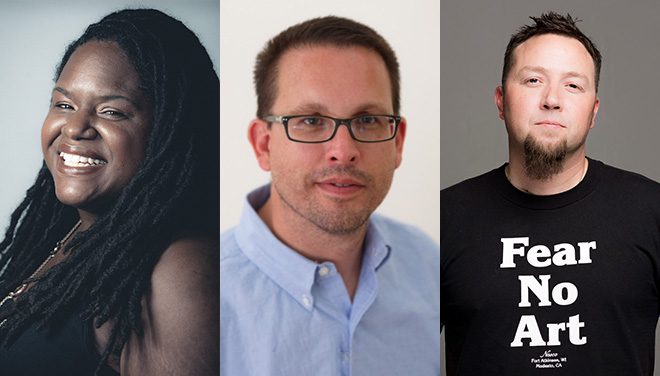The Peace Center will present the program “Palmetto Poets: Speaking on the South” on January 18, 2018. The program will feature poets DéLana Dameron, Ed Madden, and Ray McManus and will encourage community engagement through the power of poetry. SC Humanities supported this program with a Fast Track Literary Grant.
Palmetto Poets: Voices of SC will take place in the Huguenot Loft at the Peace Center at 6:30 p.m. and is free and open to the public. The tremendous trio of poets come from different walks of life, but each has much to say about the South.
A native of Columbia, S.C., DéLana Dameron is a writer and arts and culture administrator living in Brooklyn, N.Y. Dameron is the author of the book Weary Kingdom, and her debut collection, How God Ends Us, was selected by Elizabeth Alexander for the 2008 South Carolina Poetry Book Prize.
Ray McManus earned his Master of Fine Arts degree in poetry and his doctorate in rhetoric and composition from the University of South Carolina. His book Red Dirt Jesus was selected for the Marick Press Poetry Prize, and Punch was the winner of the 2015 Independent Publishers Book Award. He is an associate professor of English at the University of South Carolina Sumter, where he directs the South Carolina Center for Oral Narrative.
Ed Madden is a professor at the University of South Carolina and the Poet Laureate of Columbia, S.C. He is the author of four books of poetry: Signals (which won the 2007 S.C. Poetry Book Prize), Prodigal: Variations, Nest, and Ark. His poems have appeared in Best New Poets 2007, The Book of Irish American Poetry, and in journals such as Prairie Schooner, Crazyhorse, Poetry Ireland Review, and Los Angeles Review.
For more information, visit the event page on the Peace Center website: https://www.peacecenter.org/events/detail/palmetto-poets-speaking-of-the-south.
The mission of SC Humanities is to enrich the cultural and intellectual lives of all South Carolinians. Established in 1973, this 501(c) 3 organization is governed by a volunteer 20-member Board of Directors comprised of community leaders from throughout the state. It presents and/or supports literary initiatives, lectures, exhibits, festivals, publications, oral history projects, videos and other humanities-based experiences that directly or indirectly reach more than 250,000 citizens annually.
